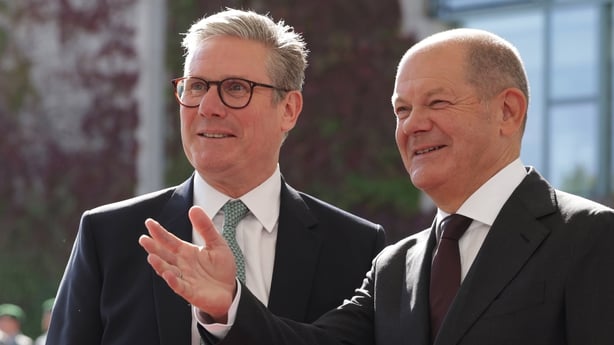A few hours after announcing that life in the UK was about to get worse, Prime Minister Keir Starmer was on his way to Berlin.
He was travelling to the German capital that Tuesday evening to meet Chancellor Olaf Scholz. Their fifth meeting since Keir Starmer took up office.
The meeting was yet another step in the Labour government's efforts to "re-set" relations with countries in the European Union. This time the pair would announce a new co-operation treaty to be signed before the end of the year. It covers a range of areas including science, culture and trade.
On Thursday, Keir Starmer would meet another European leader, Emanual Macron. While this visit attracted less attention, it was all in the same vein; to re-set relations.
It's been likened to "European speed dating". The trouble is, nobody is quite sure what Keir Starmer is looking for.
"We're still in the period of vibes," says Joel Reland, research fellow at the think-tank, UK in a Changing Europe.
He believes that the Labour policy of "re-set" is quite vague. However, he points out that there are some clues in the Labour party manifesto.
It indicates that the main aim is to secure a new veterinary agreement. This would reduce checks between the UK and EU in terms of plant and animal products.
Another aim is to break down Brexit barriers for artists trying to tour Europe.
Labour also wants to secure a "mutual recognition agreement" for professional qualifications.
It raises the question however, what concessions is the UK willing to offer to secure these aims?
Joel Reland believes a "youth mobility scheme" is the main bargaining chip that the UK has at its disposal.

"It's one area where the EU really feels that it lost out," he explains.
Such a scheme typically allows people aged between 18 to 30, or sometimes 35, to stay in the UK for two years. New Zealand, Canada and Australia already have a scheme in place with the UK.
During a press conference with the German Chancellor Olaf Scholz on Wednesday, Keir Starmer said that there were "no plans" for a youth mobility agreement with the EU.
However, political observers would say that the phrase "no plans" doesn't quite shut the door on the proposal. There were also "no plans" for tax increases in the UK until there were.
Instead, Keir Starmer spoke of educational and cultural "exchanges". Perhaps indicating that there could be a negotiated compromise, Joel Reland says.
From an Irish perspective, there is also a feeling that Keir Starmer doesn't quite know what he's looking for from his European friends. Nevertheless, they welcome what they're seeing so far.
The "re-set" in relations has been evident across all levels of government both in Ireland and the UK.
For example, on Monday, the Minister for Finance Jack Chambers will meet with his counterpart Rachel Reeves at Number 11 Downing Street.
There was a time when Irish ministers would regularly meet with their British counterparts at European Council meetings but there has been a drift ever since Brexit. Even contact between officials became stilted.
When Labour entered government in July, Simon Harris instructed all his ministers to make contact with their new opposite numbers. Several of those conversations have been taking place over the past few weeks.
Next Saturday, Prime Minister Keir Starmer will arrive in Dublin for a bilateral with the Taoiseach. They will also squeeze in the Ireland vs England match at the Aviva that evening. Officials on both sides will also have a chance to meet. This is a reciprocal visit after Simon Harris travelled to Chequers last month. The pair have now met on several occasions over the past few weeks, including at the European Political Community summit and at the Paris Olympics.
Despite all the facetime with his European counterparts, nobody is quite sure what Keir Starmer is hoping to achieve from his grand "re-set". Nevertheless, many like what they're seeing so far. Even if a normalisation in relations is all it can achieve for now, that will be warmly welcomed by many.







